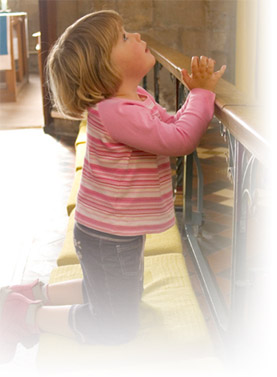Sunday Sermon for April 5, 2015, Easter Sunday, Year B
Readings: Acts 10:34a, 37-43; Col 3:1-4; Jn 20:1-9
In the Gospel reading today we hear about Peter and John entering the Lord’s grave after they had been informed by St. Mary Magdalene that Jesus had been taken away. We are told that when the Beloved Disciple saw the burial cloths there and the cloths that had covered our Lord’s head in a separate place, he believed. It is interesting that the next line says that they did not yet understand the Scriptures that said he would rise from the dead.
Jesus Himself told the Apostles that He had to be put to death, buried, and then rise again on the third day. It is obvious that the Apostles recognized that when He said this, Jesus meant something different from anything else we know of from the Scriptures. As Jews, the Apostles certainly knew of the people brought back from the dead by Elijah and Elisha. They had actually witnessed Jesus bring three people back from the dead. So, when He spoke of Himself rising from the dead, they had to have understood that it was different from these other instances, but they still did not understand what it could mean.
Of course, no one can fault them for not understanding, after all, no one have ever resurrected before. There were no concepts that could have allowed them to understand what our Lord was telling them. The people who had been raised from the dead previously were resuscitated, not resurrected. Their souls were not glorified, consequently, their bodies were not glorified either. They walked among the people, after being raised from the dead, in their natural state. They would all have to dies again in the typical, permanent manner this implies.
Still not understanding, St. John believed. He had not yet seen the risen Lord, but he clearly believed that the body of Jesus had not been taken away. After all, it robbers had taken our Lord’s body, all the burial cloths would probably have been together. It would make no sense to remove the outer cloth, pick up the body and begin to move it, then put the body down and remove the cloth that was covering our Lord’s head. This little detail noticed and mentioned by St. John, must have been enough to convince him that Jesus was alive, that He had, indeed, risen from the dead.
This said, I do not think we can say that he as yet had any idea of the resurrection. It was not until our Lord appeared to the Apostles, showed Himself to them and explained the implications of the resurrection that any of the Apostles understood. We notice, however, in the first reading, that St. Peter wasted no time, after receiving the Holy Spirit, in preaching the truth of the resurrection. It is important for all of us to recognize that our Lord required an act of faith prior to giving understanding to the Apostles. The only exception to that is Thomas, who was upbraided for his lack of faith.
This point of requiring this act of faith is important to us, not only because we have to make a similar act of faith, but because, as St. Paul tells us in the second reading, we have been raised with Christ. We have been baptized into the fullness of Christ. While Jesus was always the Christ, His work as the Christ did not happen until the Passion began. It is in His death and resurrection that He is demonstrated to be the Christ. Therefore, in our baptism, we have been incorporated into the death and the resurrection of Christ. We already exist in a manner entirely different from those who are not baptized.
Obviously, we still function on the natural level. We do not yet have resurrected bodies or glorified souls, but we share spiritually in the fullness of the death and resurrection of the Lord. We have died with Him and we have risen with Him; this still has to be experienced physically in each of us, but it is a reality that is already at work in us. We, therefore, need to conform ourselves to this reality and strive to live in a truly Christlike manner.
Being baptized into the death and resurrection of our Lord, death has no more power over us than it does over Him. Death is not something to fear because it is the doorway to eternity and it is the means by which we can share fully (physically) in the death and resurrection. If we die in the state of Grace, our souls will be glorified and, on the day of resurrection, our bodies will be reunited with our glorified souls and share in that same glory. We believe in the resurrection of the Lord and, therefore, we have confidence in our own glorification through Him.
Fr. Altier’s column appears regularly in The Wanderer, a national Catholic weekly published in St. Paul, Minn. For information about subscribing to The Wanderer, please visit www.thewandererpress.com.

